China has been seeking to influence Taiwanese elections using its ties with local Matsu (媽祖) temples, academics said yesterday as they shared the results of their research published in Foreign Policy Analysis.
Liu Yu-hsi (劉裕皙), one of the authors of “In the Name of Mazu: The Use of Religion by China to Intervene in Taiwanese Elections,” said the international community has been increasingly aware of Russian and Chinese attempts to intervene in foreign elections through religion.
At a forum hosted by the Democratic Progressive Party, the associate professor at Shih Hsin University said that the Chinese Communist Party has sought to use its agents to influence small and medium-sized enterprises, those with low to middle incomes, and residents in central and southern Taiwan.

Worshipers wear masks to help curb the spread of COVID-19 as they pray for blessings at a temple on the first day of the Lunar New Year celebrations in Taipei on Jan. 22 last year.
Photo: Chiang Ying-ying, AP
Such efforts began targeting local residents and young people in 2017, she said, citing Kaohsiung voting data from 2014, 2016, 2018 and 2020 to show that China had been using Matsu temples as a main channel to exert influence over Taiwanese elections.
Chinese agents use temples to contact members who do not have clear political leanings and seek to influence them through daily communications and by gradually feeding them disinformation, she said.
Boroughs with Matsu temples have been more prone to vote for pro-China leaning political parties in presidential elections — 2016 and 2020 — and estimates show that one temple exerts influence over an average of 925 votes, the research showed.
Not all Matsu temples have been “infiltrated,” and it depended on how they were run, Liu said, adding that if members were stable and did not need to visit China often, then they would not be as affected by China’s “united front” rhetoric.
Temples in rural areas were also less affected, the paper says.
Another author, Sher Chien-yuan (佘健源), a National Sun Yat-sen University associate professor, said that borough wardens believed to have been influenced by China had allegedly mobilized borough residents, resulting in overwhelming support for the Chinese Nationalist Party’s (KMT) anti-ractopamine pork referendum question: “Do you agree that a ban should be in place to prohibit the import of pork and pork products containing ractopamine?”
The article says that in boroughs in Taipei, New Taipei City, Taoyuan, Taichung and Kaohsiung with wardens suspected of having Chinese ties, 4.7 percent more residents voted for the referendum.
Also speaking at the forum about China, Taiwan Sport Forward Association executive director Liu Po-chun (劉柏君), who has a background in religious studies, said that communist parties do not believe in religion.
When China talks about religion, it often harbors ulterior motives, she said.
Source: Taipei Times - 2024/06/19




















